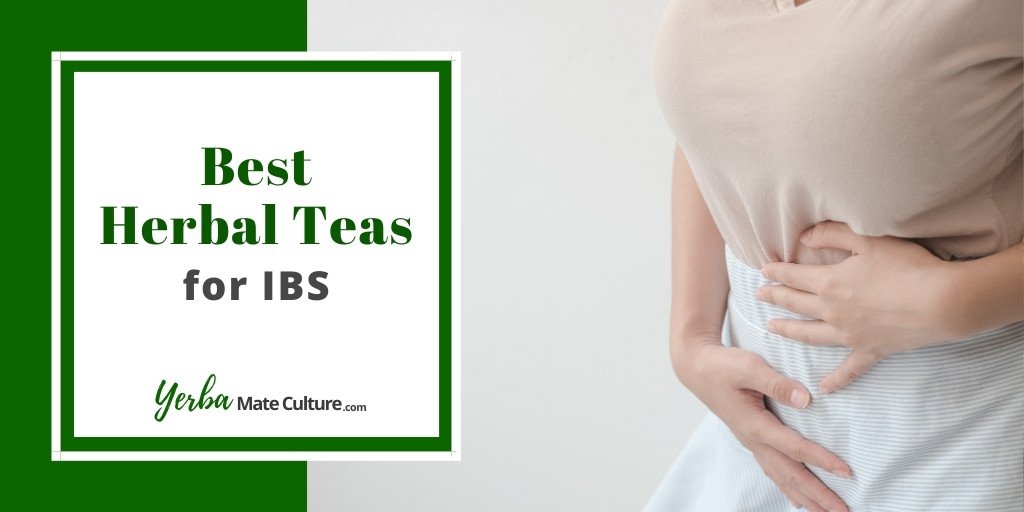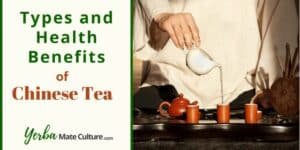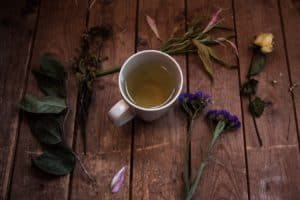I’ve got a sensitive stomach and have suffered from irritable bowel syndrome (IBS) for years. This condition can cause unpleasant and even embarrassing situations. I have spent a lot of time trying to find remedies and ways to avoid the symptoms.
In this guide, I will explain what IBS is and what are the best herbal teas for treating it.
In addition to using herbal teas, I will also share more tips for relieving this painful and annoying condition.
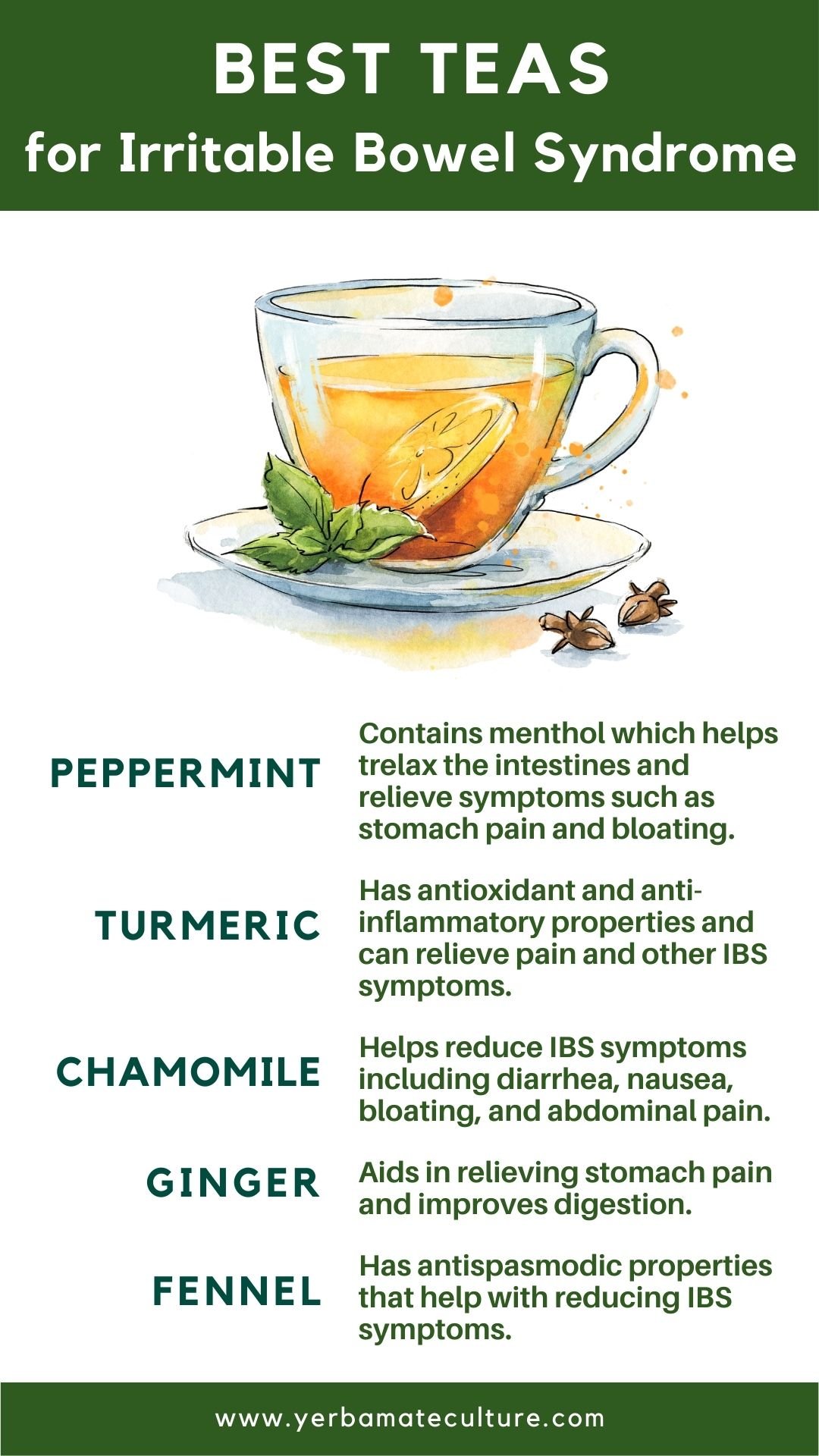
If you are suffering from severe IBS, you should probably see a gastroenterologist. However, even these experts might not be able to point out an exact cause or provide an effective solution.
Unfortunately, there is no quick fix to this problem. But there are several natural ways to relieve its symptoms and start healing your gut.

After digging deep, exploring scientific research, and trying out things myself, I found some pretty good ways to relieve IBS. I can’t guarantee they are effective on everyone, but I suggest you give it a try.
Herbal teas are a great natural way to treat IBS symptoms. When combined with some other methods, like following an appropriate diet and reducing stress, they can be quite effective in treating it.
Having IBS is already bad enough. But in addition, I have also suffered from acid reflux (GERD) and heartburn. This is not uncommon, as studies have found a strong link between these conditions.
If you are frequently suffering from acid reflux and heartburn, I recommend that you also read my article about natural remedies for these conditions.
Before looking at the herbal teas and other tips, I think it is important to get a better understanding of IBS and what is causing it.
What is IBS?
Irritable bowel syndrome, or IBS for short, is a common and debilitating gastrointestinal (GI) condition that affects the large intestine. The condition is often diagnosed in people under 45 and is more common in women than men.
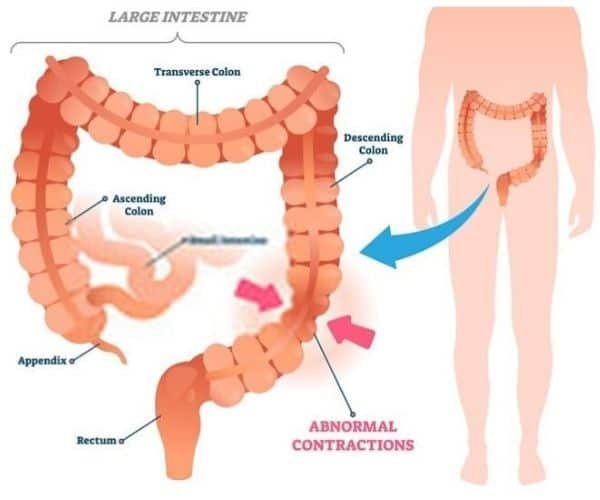
The cause of this disorder is not quite clear and there is no cure for it. However, scientific studies suggest that people develop IBS due to changes or dysfunction in the intestine, colon, digestive system, immune system, and even the brain.
Since the brain and gut are connected, certain psychological factors such as stress, anxiety, or depression can trigger the condition.
Possible causes for IBS include:
- Eating certain foods (see diet tips below for more information)
- Inflammation caused by an infection
- Muscle contraction in the intestine
- Loss of good bacteria in the gut from antibiotic use
- Bacterial overgrowth in the small intestine and colon
IBS Symptoms
Living with the discomforting symptoms of IBS every day can be daunting. Symptoms usually vary from person to person, especially since IBS is divided into 4 main types: IBS-C (constipation), IBS-D (diarrhea), IBS-M (mix of diarrhea and constipation), and IBS-U (unclassified).
Needless to say, you may experience recurring abdominal cramping that is often relieved after a bowel movement.
Other common IBS symptoms are:
- Bloating
- Constipation
- Diarrhea
- Excess gas
- Change in bowel habits, e.g., alternating between constipation and diarrhea
How to Avoid IBS Symptoms
Irritable bowel syndrome is a chronic problem known to reduce the quality of life of those battling this disorder. Luckily, some days are better than others, in terms of the symptoms that show up.
Standard treatments for IBS include:
- antispasmodics, anti-diarrhea, and antidepressant medication
- behavioral therapy
- psychotherapy
These treatments are limited in their effectiveness, which is why an estimated 40% of patients use alternative medicine to treat IBS symptoms.
I can also tell you that based on my experience using medication will most likely provide an acute solution to IBS symptoms, but it can not solve the actual problem.
It is not a good idea to take strong pills daily just to treat the symptoms. This will surely come with side effects if continued for an extended time.
I am not telling you to completely avoid using medication. For example, if you are going to a family dinner, it might make sense to take some pills to avoid the symptoms during that event. But in the long term, there must be a better solution to this problem.
1. Diet, Probiotics, and More
In my opinion, the best way to avoid IBS symptoms and enjoy your life is to make some permanent changes in your diet and lifestyle. This includes managing stress, exercising, and avoiding foods that trigger the symptoms.
Try avoiding the following foods, because they are known to trigger IBS symptoms:
- Gluten (e.g. rye, wheat, and barley)
- Fatty, fried, and sugary foods
- Dairy products
- Foods that increase gas (e.g. beans and legumes)
- Caffeinated drinks
- Alcohol
- Processed foods
- Garlic and onions
- Sugar-free sweeteners
If possible, clean your diet completely for a while. I know this might be hard, but it will give your gut some time to restore its health. After you start feeling better, you can slowly try eating and drinking some of the things that you had to avoid.
Eat foods rich in soluble fibers (e.g. root vegetables, oatmeal) especially if you are experiencing diarrhea. You can also take probiotic or prebiotic supplements as they are helpful in restoring gut flora/bacteria. I have tried different probiotic tablets and capsules, but it’s hard to say if they were effective.
One great option is to regularly consume foods that naturally contain beneficial bacteria.
Have you already tried kimchi and sauerkraut? If not, go ahead and see if you like these foods and consider adding them to your diet, because they are rich in probiotics.
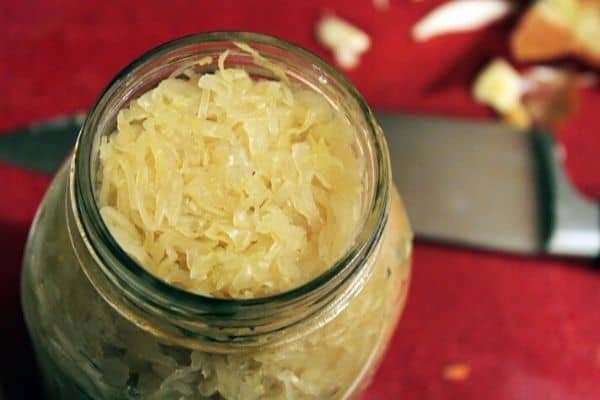
2. Listen to Your Body
One of the most important things I have learned is to listen to my body, or gut in this case. If someone is offering you a fried and oily food and you already get a feeling that it might be better to avoid it, then politely decline.
With a bit of practice, you can probably learn to sense what your stomach is ready to digest.
When you feel good, relaxed, and hungry, it could be ok to eat more and not worry too much. But if you have a gut feeling that you might not be able to digest a heavy meal, then go with something lighter like steamed potatoes and carrots with fish.
5 Best Herbal Teas for IBS
With medical drug treatments, you have to deal with the adverse side effects they might cause. For example, nausea and abdominal pain, not to mention the risk of pancreatitis associated with some commonly prescribed drugs for IBS.
Wouldn’t it be great to get relief by simply drinking some delicious herbal teas? I think that’s a “YES”!
Then continue reading, because I’m about to introduce 5 teas, that have science-backed effects in treating IBS and encouraging healthy gut function.
1. Peppermint Tea
Peppermint is a fresh-smelling plant with powerful medicinal properties. Its leaves, oil, and capsules made with peppermint extract are often used for gas, bloating, and to relax the digestive system.
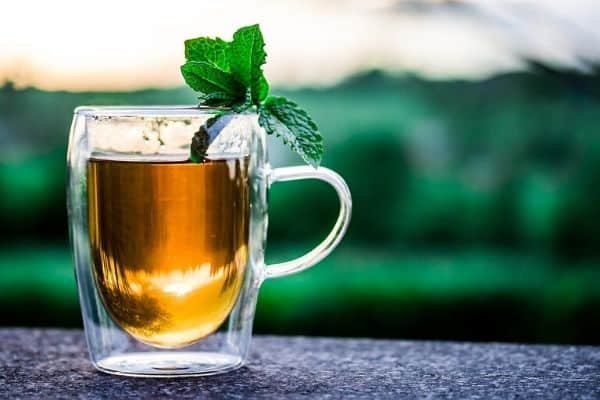
Peppermint contains menthol which has antispasmodic properties. This means that the herb has a relaxing effect on the intestines.
A study from 2014 examined the usefulness of enteric-coated peppermint oil as a natural treatment for IBS. The result was that peppermint oil is safe and effective to use on a short-term basis. More studies are recommended to assess its safety for long-term use.
Several other studies have also investigated the safety and effectiveness of using peppermint oil in treating irritable bowel syndrome. It has been found to be an effective and safe form of therapy for pain and other symptoms in adults with IBS.
I often drink a cup of peppermint tea after a meal. I feel like it is one of the best teas for digestion and prevents or relieves symptoms like stomach pain and bloating. Sometimes I also mix it with other herbs like ginger.
Based on research and my experience, this might just be the best tea for IBS!
Whether you like pure peppermint tea or a blend of herbs, you can find some great mint teas in this guide.
2. Turmeric Tea
Turmeric is commonly used for treating maladies such as arthritis, cancer, Alzheimer’s, and, yes, IBS. The powder made from turmeric root (Curcuma longa) is a yellow-orange spice that the Indians and Chinese have used for its taste and health benefits for centuries.
It is known as a superfood because its active ingredient, curcumin, is packed with anti-inflammatory and antioxidant substances.
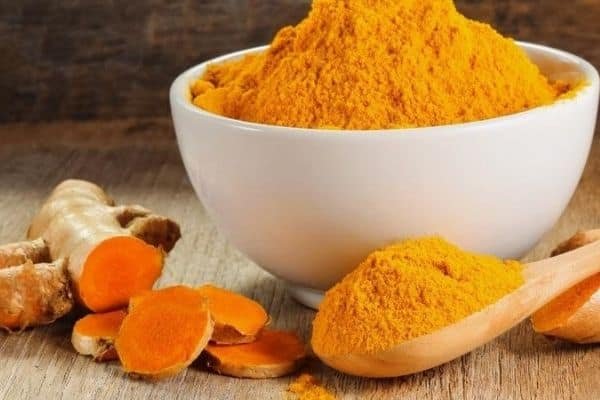
You can whip up a cup of tea quite easily using a turmeric extract, tea bags, or by boiling 1 to 2 teaspoons of grated, ground, or powdered turmeric root in water.
I have also put together an article with my favorite turmeric tea products.
A pilot study on the use of turmeric for irritable bowel syndrome concluded that a standardized turmeric extract can relieve abdominal pain and discomfort. Some patients who participated in the clinical trials also reported positive changes in bowel patterns.
Results of another study suggest that curcumin’s antioxidant and anti-inflammatory activities help with relieving pain and other IBS symptoms. This indicates that it might be a great aid in improving the quality of life.
In addition, a recent review concludes that curcumin favors the growth of beneficial bacteria strains (e.g. Bifidobacteria and Lactobacilli) and reduces pathogenic strains, which is good for the smooth functioning of the digestive system.
3. Chamomile Tea
Another herbal beverage that may improve gastrointestinal function in people with IBS is chamomile tea.
This healthy herbal tea is made from the dried chamomile flower of a daisy-like plant belonging to the Asteraceae plant family. It is known for its delicately floral taste and is traditionally used for relaxation due to its sedative effects.
What many people don’t know, is that this herb can also be used as medicine for digestive disorders such as upset stomach, colic, gas, and ulcers.
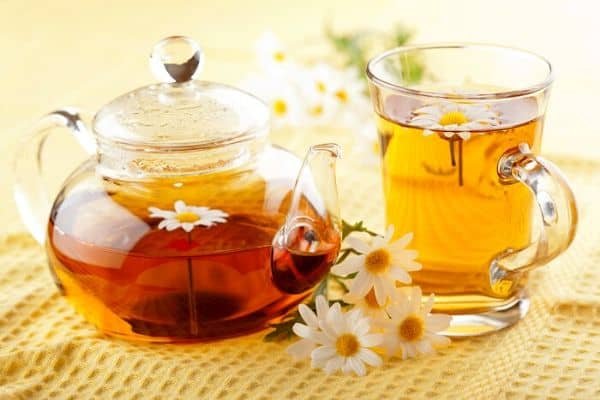
Various studies tested the impact of standardized chamomile extracts on IBS. In one study, 45 patients with IBS who were otherwise healthy were given a chamomile drop treatment for two weeks. Their symptoms significantly decreased at the end of the treatment and continued to improve into the four-week mark.
The particular symptoms were bloating, diarrhea, nausea, abdominal pain, and constipation. The therapeutic relief of the herb is largely owed to its anti-inflammatory effects that help with reducing intestinal muscle spasms in patients with IBS.
If you are planning on making some of this soothing herbal beverage, check out my guide for the best chamomile teas.
4. Ginger Tea
I absolutely love me some ginger tea.
Raw ginger root and ginger extracts are loaded with anti-inflammatory, anti-oxidant, and anti-ulcer properties that can potentially relieve IBS symptoms.
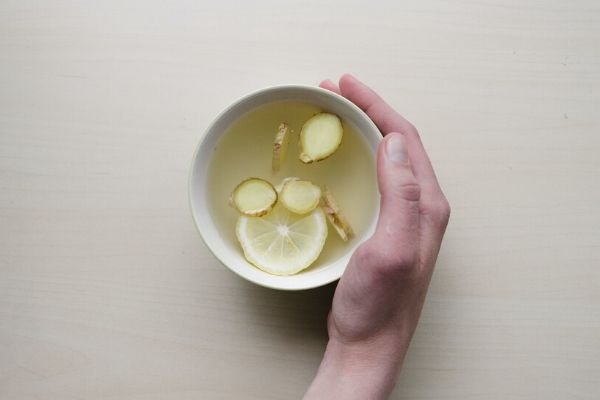
This is no surprise since ginger (Zingiber officinale) has a long history of medicinal use in China and India.
In fact, there is evidence suggesting that ginger can positively affect IBS symptoms. The herb has antiemetic and analgesic effects that can help relieve upset stomach and pain. It can also aid the movement of food in the gut as well as digestion.
You can find fresh ginger roots at your local market and easily make yourself a soothing cup of tea using freshly grated ginger.
To make things easier, get some of these recommended ginger tea products.
5. Fennel Tea
Fennel tea can be used in your diet as an alternative or complementary medicine for IBS symptoms. The tea is made from dried fennel seeds. It has a strong smell, a slight licorice-like taste, and can be a perfect natural digestive aid.
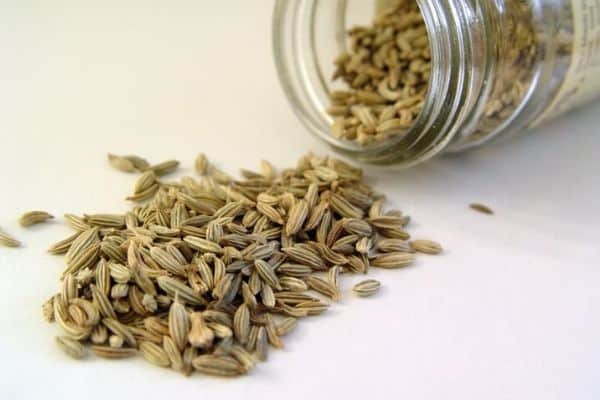
Fennel is a vegetable that contains volatile oils that can help relieve gas, bloating, diarrhea, constipation, and abdominal pain caused by intestinal spasms. The herb is also thought to be good for relieving constipation.
A 2016 study combined fennel and curcumin essential oils (CU-FEO) to treat 121 participant patients with mild to moderate IBS symptoms. After 30 days of treatment, most of the participants experienced reduced abdominal pain and a decrease in the severity of all other IBS symptoms.
The positive result is largely due to the antispasmodic and carminative properties of fennel and the anti-inflammatory effect of curcumin. Not only did (CU-FEO) significantly improve their symptoms, but it also improved the quality of life of those IBS patients over the 30-day treatment period.
How to Treat IBS
Ok, it’s time to wrap things up. Let’s summarize how you can better cope with irritable bowel syndrome and start recovering from it.
Drink Herbal Teas
Are you ready to try herbal teas for irritable bowel syndrome? They are healthy, flavorful, and easy to make.
In general, herbal teas are considered safe for the treatment of IBS.
That makes them a great option compared to using traditional drugs prescribed to patients as their long-term use can cause severe side effects.
Experiment with different herbal teas to find your favorites. For example, you can try my recipe for golden milk. It combines turmeric, ginger, and other ingredients into a powerful herbal remedy that tastes delicious.
Note: I recommend making the vegan version with plant-based milk, as dairy products could make your IBS symptoms worse.
Herbal teas are not regulated by the United States Food and Drug Administration. While these teas may help with managing certain IBS symptoms and improving gut health, more research is needed on the extent of their safety and efficacy as a long-term home remedy for this GI disorder.
If you have a severe IBS and take medication, it’s important to talk with your doctor before including herbal teas in your food plan. Turmeric, ginger, peppermint, fennel, and chamomile extracts may contain ingredients that can interact with the medicine you are using.
My 7 Best Tips for Getting Better
Here are my best tips for relieving IBS symptoms and recovering from it:
- Avoid eating foods that trigger your symptoms. You can start by eliminating or reducing gluten, dairy, and fatty foods.
- Eat foods that are easy to digest and contain probiotics and prebiotics. As much as possible, eat something that feels good on your stomach. You can also try sauerkraut and kimchi.
- Listen to your body. What is your gut telling you? If you don’t feel good, eat something light. You can always eat more later if you start feeling better.
- Try drinking herbal teas every day. Experiment with different herbal teas and blends to see which ones are the best for you.
- Avoid drinking caffeinated drinks and alcohol. Strong liquor can be especially harsh on your gut.
- Exercise, sleep well, and avoid stress. This is easier said than done, but a healthy lifestyle is important for avoiding IBS symptoms. Stress and other mental factors can trigger this condition or make it worse.
- Try taking digestive enzymes before meals. I have found that taking natural enzymes, like Now Foods Super Enzymes, can really help with digestion and avoiding IBS-related issues. Click here to order from Amazon.
I have successfully used these methods to reduce my IBS symptoms and I don’t experience them very often anymore. This means I can take it easy, and don’t have to follow the list above strictly. However, sometimes my IBS starts getting worse, and then it’s time to really pay attention to following them again.
IBS (Irritable Bowel Syndrome) FAQ
Why does IBS happen?
Scientific studies suggest IBS is caused by dysfunction in the intestine and colon, as well as poor communication between the brain and digestive system. This causes symptoms such as bloating, constipation, diarrhea, and excess gas.
How to avoid IBS symptoms?
You can avoid IBS symptoms by reducing gluten, dairy, and fatty foods and eating something that is easy to digest. You should also avoid drinking caffeinated drinks and alcohol. Instead, try using the herbal teas introduced in this article. It is also important to do some regular exercise, sleep well, and avoid stress.
What are the best herbal teas for IBS?
Based on my own experience and scientific research the best herbal teas for IBS are peppermint tea, turmeric tea, chamomile tea, ginger tea, and fennel tea.
Is peppermint tea good for IBS?
Yes, peppermint tea is considered one of the best home remedies for IBS. It relaxes the intestines, relieves abdominal pain, and reduces bloating. Peppermint tea also aids with digestion so you can try drinking it after each meal.
Please post a comment below and tell me what you think is the best tea for IBS. Also, if you have any additional tips for treating it naturally without medication, I would love to hear them.
I really hope that you will find some help from this guide. Drink your herbal teas and get better soon!
-Joonas

